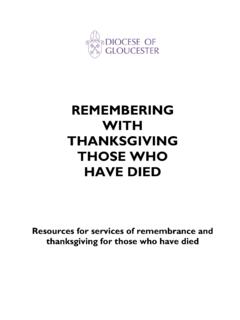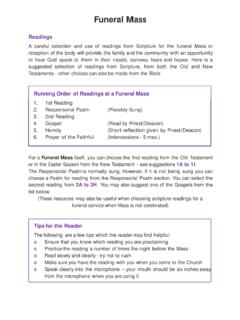Transcription of Leading Intercessions Guide - Diocese of Gloucester
1 Leading Intercessions A Practical Guide DEPARTMENT OF MISSION AND MINISTRY Leading Intercessions in public worship is a wonderful ministry in which to share. In our Intercessions we unite our prayers for the world and its needs with the prayer of Christ himself who ever lives to make Intercessions for us . Those that lead Intercessions have the responsibility of enabling the rest of the congregation to share in this offering of prayer as they give voice to the concerns, hopes and thanksgivings of the community. This booklet has been prepared on behalf of the Diocesan Worship, prayer and Spirituality Group to provide practical guidance and advice for those who lead Intercessions .
2 It can be used as the basis for providing Intercessions training locally and/or as a handout for people to use in their own preparations. Further resources are suggested at the end. "In the morning, while it was still very dark, Jesus got up and went out to a deserted place, and there he prayed" Mark 1:35 "They devoted themselves to the apostles' teaching and fellowship, to the breaking of bread and the prayers" Acts 2:42 "Jesus said 'When you Luke 11:2 Devote yourselves to prayer , keeping alert in it with thanksgiving Colossians 4:2 For our world - First of all then, I urge that supplications, prayers, Intercessions and thanksgivings be made for everyone, for kings and all who are in high 1 Timothy 2.
3 1-2a For the church - At the same time, pray for us as well that God will open to us a door for the word, that we may declare the mystery of Colossians 4:3 On behalf of all - Pray in the Spirit at all times in every prayer and supplication. To that end keep alert and always persevere in supplication for all the saints. Ephesians 6:18 The Intercessions are the sum of all our individual thoughts and prayers - a time to bring our corporate concerns to God. The Intercessor is Leading the prayers of the people - which is why it s so important that it is the laity's role to lead them if possible.
4 Remember intercession is one type of prayer - confession, praise, thanksgiving appears elsewhere in the service. Books of prayers can provide helpful resources, but it is good to also directly address the circumstances of your parish and the issues of the day. Remember that there is no need to update the Almighty with all the affairs of the world or parish - God knows more than we do! Try to be inclusive - using lists can exclude some people from the prayers. Be as all-embracing and free from political bias or personal opinion as you can. In particular avoid focussing on one side of a current issue. All those present should be able to endorse the prayers and say "Amen!
5 " at the end. Be careful when praying about issues which may be sensitive to members of the congregation. Try and think through how your prayers will be heard by people who have different views and experience of divorce, abortion, motherhood etc. The best liturgical prayer is simple, brief and modest. It should use language that can be understood by everyone, WHY PRAY? WHAT ARE WE CALLED TO PRAY FOR? INTRODUCTION WHAT ARE OUR Intercessions FOR? WHAT DO I PRAY? avoiding anything too trendy or too intellectual! Acronyms and Christian jargon should probably be avoided. The context in which you are worshipping is crucial what kind of service is it; who is attending; etc.
6 Intercessions at the main Sunday Eucharist should last between three and five minutes, including a period of corporate silence. This is only around four hundred words; simplicity, brevity and modesty are essential! Different church traditions have different ways of praying, but there are three common patterns for Intercessions : Litanies: short sections of prayer with a repeated response at the end of each section, "Lord in your ", hear our prayer . Collects: with a phrase at the end of each prayer which invites the congregation to respond with "Amen". (See, for example, the prayers at the end of Evening prayer /Evensong).
7 Bidding prayers: with a period of silence after each introduction, concluding with either Amen or responses as appropriate. It is easiest to conclude with a regularly used response, "Lord in your mercy", or "Lord, hear us", so that everyone can respond. If you are using a special response, keep it simple and snappy ( Your kingdom come; your will be done , and introduce it clearly at the beginning of the Intercessions . Before people begin to pray, repeat the bidding allow a brief pause, an in breath, and lead the response. You do not want people to spend all their energy on remembering the response. It is not necessary to use "Merciful " at the end every time.)
8 You could use a Collect instead (examples can be found in the main volume of Common Worship). Not everything has to be covered every time. Common Worship instructs us that the prayers of intercession, usually include these concerns and may follow this sequence : The Church of Christ Creation, human society, the Sovereign and those in authority The local community Those who suffer The communion of saints (the departed) The prayers will express some of the concerns very briefly. It is often helpful to follow the sequence of concerns above as our focus narrows from the all-embracing to the most local and particular.
9 Other special concerns and thanksgivings may also be appropriate, for example the charities or groups our church supports, or issues raised by the readings. It may be appropriate to pray for particular parish events and activities, but you do not need to cover everything. You might include prayers for those being baptised or confirmed, the sick and those who have died generally or by name. Remember to be pastorally sensitive hearing someone s name in the prayers may be the first time some of the congregation hear about it. Do make sure permission is given to include people s names, if they are on an official prayer list, this should be fine.
10 If you know a wedding couple is in church to hear their banns read, it would be welcoming to include them in the prayers. Try not to have too many books and papers which can be distracting to the people and difficult for you to manage. If you can write all your text out on one sheet, so much the better. Get to the place you are interceding from in good time, ready to start with confidence. FRAMEWORKS TO USE TOPICS TO COVER PRACTICAL ADVICE Know whether you, or the president, will invite the people to pray, In the power of the Spirit, and in union with Christ, let us pray to the Father . If someone else has done so, then you do not need to have an introductory sentence to your prayers.


